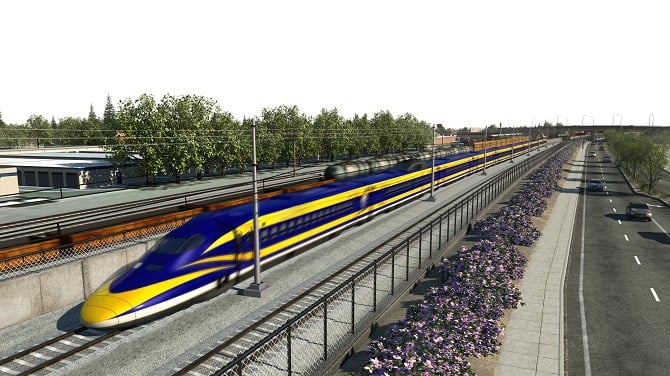The estimated cost to build a high speed rail line connecting Los Angeles and San Francisco has soared 20 percent to a minimum of $77 billion, according to the latest draft business plan from the California High Speed Rail Authority released on March 9.
That’s up from the previous estimate of $64 billion released two years ago. But the report warns that $77 billion cost could in a worst-case scenario jump another $20-plus billion to $98 billion. And the completion date of a partial line from San Jose to Wasco (30 miles north of Bakersfield) has been pushed back from 2029 to 2033.
The report blames land acquisition costs and delays in the Central Valley that have far exceeded even the worst-case projections, pushing the cost for this easiest-to-build segment up to $10.6 billion from $6 billion. It now projects out these substantially higher acquisition costs and longer delays through the rest of the planned project.
Construction began four years ago along a 119-mile stretch in the Central Valley. The business plan calls for completion of that segment by 2022. The focus would then turn to segments between San Francisco and Gilroy and between Madera and Bakersfield.
So far, the state authority only has about $17 billion to $20 billion in funds committed to the project, depending on how much revenue comes in from the state’s cap-and-trade carbon emission reduction program. There’s the $9.9 billion bond measure California voters approved a decade ago, supplemented with $3.5 billion in federal funds (mostly federal stimulus dollars from 2009 through 2011) and the aforementioned cap-and-trade revenues.
The original proposal that voters approved in 2008 pegged the project cost at $33 billion. Besides the $9.9 billion in state-issued bonds, backers were also counting on $10 billion in federal funds and $13 billion in private-sector financing. So far, there’s been little or no private sector investment.
With this latest cost estimate, the funding gap has grown to at least $55 billion and possibly as high as $80 billion.
Economy, education, energy and transportation reporter Howard Fine can be reached at [email protected]. Follow him on Twitter @howardafine.

